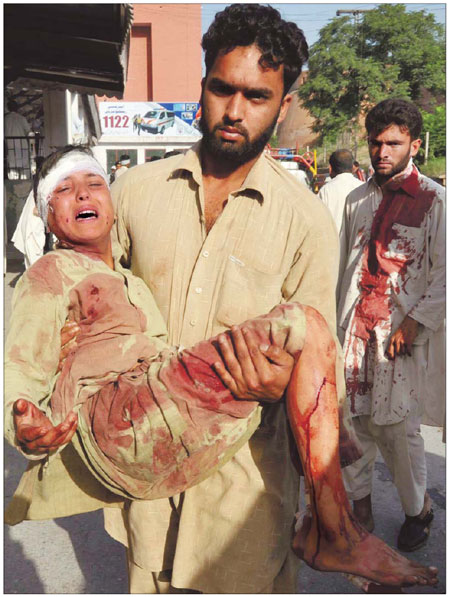Asia
Revenge attacks rattle Pakistan
Updated: 2011-05-14 07:23
By Li Lianxing, Zhang Haizhou, Qin Jize and Cui Haipei (China Daily)
|
A Pakistani man carries an injured blast victim to a hospital in Peshawar on Friday following a suicide and bomb attack on paramilitary police in the northwestern Charsadda district. [Hasham Ahmed / Agence France-Presse] |
Expert warns of bin Laden being 'more powerful' in death than in life
Islamabad / London /Beijing - Blasts from two suicide bombers that killed at least 80 people in northwestern Pakistan are just the beginning of massive al-Qaida actions to avenge the killing of Osama bin Laden, analysts said.
"It's just the start of another vicious circle," said Dong Manyuan, a researcher with the China Institute of International Studies.
Friday's attacks at a paramilitary academy in Shabqadar near Peshawar were retaliation for the killing of bin Laden by US special forces on May 2.
The Taliban claimed responsibility, blaming the Pakistani military for failing to stop the US raid.
Dong said the bombings show that the various al-Qaida groups are capable of continuing their actions without the unifying symbol of bin Laden.
"The death of bin Laden has not caused fatal wounds to al-Qaida's capability for action or its social foundation," Dong said.
Analysts believed that since the Sept 11 attacks, al-Qaida's network has become less pyramid-shaped and has grown in a regional and dispersed way.
Even without a central command, al-Qaida groups in Iraq, Saudi Arab and Yemen can conduct attacks or train new fighters, said Li Wei, director of the anti-terrorism research center at the China Institutes of Contemporary International Relations.
Scott Lucas, a professor in international affairs and American foreign policy at the University of Birmingham in the UK, said the attack "is not unexpected because it is part of an ongoing process".
"There were bombings well before bin Laden even arrived in Pakistan, and there will be bombings after his death because we are in the middle of an ongoing insurgency," he said.
"The Pakistani Taliban has used his death as a sort of propaganda device to justify the attacks today. And they continue to campaign," Lucas said, adding that the attack on the police force is "a symbolic attack" and is "just evidence of what they will be seeking to do".
A police officer at the scene said 66 of the dead were recruits. About 120 others were injured.
About 900 young men were leaving the academy after six months of training and were looking forward to going home, said people at the scene.
Jamie Metzl, executive vice-president of the Asia Society in New York, said: "Unless Pakistan stops playing a double game of fighting some terrorists while supporting others, Pakistan-US relations will become even more strained and Pakistan itself will come under threat from the monster it has helped create."
Ed Husain, senior fellow at the Council on Foreign Relations, a think tank in the United States, said: "There is a real risk of Osama bin Laden becoming more powerful in his death than he was alive."
Athar Abbas, major general of Inter Service Public Relations, agreed the Pakistani Taliban had chosen the site because it was a training center for frontier soldiers.
"It further indicates that the loss of Pakistan in the counter- terrorism war is enormous, and Pakistani military forces have prepared for possible attack, have set high alert to safeguard potential targets," he added.
Su Hao, director of the Center for Strategic and Conflict Management at China Foreign Affairs University in Beijing, said Pakistan has made tremendous sacrifices in the war against terrorism.
Su said that because the US has a large number of people and military facilities in Pakistan, similar attacks are likely to happen again in that country.
In another development, Pakistani intelligence officials said a US missile strike killed three people near the Afghan border on Friday.
The four missiles struck a vehicle in the Doga Madakhel village of North Waziristan tribal region. North Waziristan is home to many militant groups dedicated to attacking Western troops in Afghanistan.
AP and Zhang Yuwei in New York contributed to this story.
E-paper

Green works
Wuxi becomes 'test case' for facing country's environmental challenges
The global rise of Chinese brands
China-EU trade on solid ground
ZTE banks on innovation
Specials

The song dynasty
There are MORE THAN 300 types of Chinese operas but two POPULAR varieties are major standouts

Cut above the rest
One of the world's oldest surgeons has performed more than 14,000 operations

From the ground up
Architect of Guangzhou Opera House has many projects under way, including 2012 Olympics.

